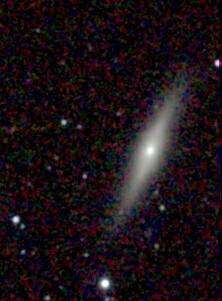NGC 7332
| NGC 7332 | |
|---|---|
|
| |
| Observation data (J2000 epoch) | |
| Constellation | Pegasus |
| Right ascension | 22h 37m 24.5s[1] |
| Declination | +23° 47′ 54″[1] |
| Redshift | 0.003909[1] |
| Helio radial velocity | 1197 ± 5 km/s[1] |
| Distance |
67.1 ± 11 Mly (20.6 ± 3.4 Mpc)[2] |
| Apparent magnitude (V) | 12.0[1] |
| Characteristics | |
| Type |
S0 pec edge-on[1] lenticular galaxy[3] |
| Apparent size (V) | 4.1' x 1.1'[1] |
NGC 7332 is an edge-on peculiar lenticular galaxy[1][3] located about 67 million light-years away.[2]
NGC 7332 and NGC 7339 form a dynamically isolated binary system (number 570 in the catalog of double galaxies compiled by Igor Karachentsev),[3] and are likely orbiting each other.[3] NGC 7332 is the brighter of the two galaxies.[3]
In the sky NGC 7339 lies 5' away from NGC 7332.[4] NGC 7332 is an unusually blue object with a corrected apparent B-magnitude of 11.5.[4] A 130mm to 200mm telescope will be needed to visually detect this pair of galaxies.[5] The two galaxies will appear at almost a right angle to one another.
References
- 1 2 3 4 5 6 7 8 "NASA/IPAC Extragalactic Database". Results for NGC 7332. Retrieved 2010-07-12.
- 1 2 "Distance Results for NGC 7332". NASA/IPAC Extragalactic Database. Retrieved 2010-07-12.
- 1 2 3 4 5 "NGC7332/7339". National Optical Astronomy Observatory (NOAO). Retrieved 2010-07-12.
- 1 2 Fisher, David; Illingworth, Garth; Franx, Marijn (1994). "The dynamics and structure of the S0 galaxy NGC 7332". Astronomical Journal. 107 (1): 160–172. Bibcode:1994AJ....107..160F. doi:10.1086/116841.
- ↑ "Re: NGC 7332 and NGC 7339". Cloudy Nights Forum Archives (Deep Sky Observing). 2005-08-27. Retrieved 2010-07-12.
External links
- NGC 7332 on WikiSky: DSS2, SDSS, GALEX, IRAS, Hydrogen α, X-Ray, Astrophoto, Sky Map, Articles and images
This article is issued from Wikipedia - version of the 10/6/2014. The text is available under the Creative Commons Attribution/Share Alike but additional terms may apply for the media files.
